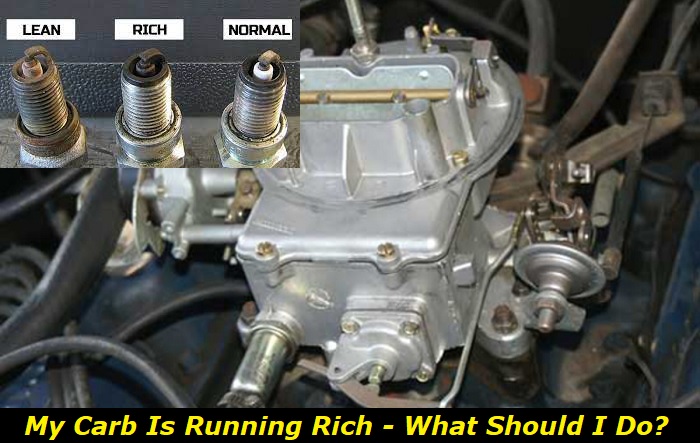The signs of a carburetor running rich include excessive fuel consumption, burnt spark plugs, poor engine performance, and rough idle. The key to solving this problem is to fix the faulty component responsible for the excess fuel intake. In some cases (when a carburetor is faulty) you'll have to fix the carburetor or tune it down.
Fuel supply problems highlights
- Level of importance:Very high
- Can you drive?Usually, no
- DIY inspection:Possible
- DIY repairs:Mostly,impossible
- Price of repair:$300 - $650
- Commonreasons:Fuel pump, fuel filter, fuel lines, EVAP system, electrical problems
- How to fix:Check the pump, verify it has power, check the fuelfilter

Symptoms of Carburetor Running rich
Watch out for these signs/symptoms in your car because they could mean that too much fuel is entering your engine:
1) Excess Fumes from the exhaust
The fumes (carbon monoxide) from your exhaust may be waste, but they can pretty much tell you when something is off in your car. When your vehicle runs rich, you'd always notice it releases more fumes than usual.
This happens hugely because the catalytic converter is overworked due to the fuel-rich mixture it receives from the engine. A catalytic converter works to burn off excess fuel in your car. You'll always find this component close to the exhaust manifold in cars that use carburetors,
When your engine runs rich, your car typically sends raw fuel to the catalytic converter, and this may cause it to overheat and fail. A failed catalytic converter will release excessive fumes since the fuel isn't combusted properly.
2) Rough Idle
Keeping your car in idle mode is another way to tell if your engine is working properly. If it's running rich, you'd certainly experience rough idling (vibrations, jerks, etc.). Note that several things can be responsible for a rough Idle.
However, if you notice this symptom in addition to any of the other ones listed here, then be sure that you have a problem with the air/fuel mixture in your car.
3) Burnt Spark Plugs
Your spark plugs are a very necessary component for your car's ignition. It's the spark from these plugs that ignite the air/fuel mixture so the engine can generate power. However, if the mixture is too concentrated with fuel, your plugs will burn quite easily.
Ideally, spark plugs should be changed from time to time, but if you notice your plugs are getting burnt quicker than usual, suspect your carburetor.
4) Car Consumes Too Much Fuel
This, of course, is one of the easiest symptoms to spot. Let's say you just filled up your tank recently and then realize not long after that your gauge is showing a half-empty tank. It is a clear sign that something is wrong.
One of the side-effects of carburetor running rich-it wastes your fuel and, ultimately, your money.
5) Engine Performs Poorly
A sound air/fuel mixture is necessary for the proper running of your engine. This is why when the fuel component is too much, your engine will misbehave or even fail.
The excess fuel in your engine can wash off engine oil and lubricants in moving parts, leading to unwanted friction or even engine breakdown. In severe cases, your car may not even start.
This is why you fix the problem of your carburetors running rich as soon as you notice it, to avoid further complications.
How To Fix Carburetor Running Rich
To fix this issue, you must first try to diagnose the true cause of why your carburetor is running rich. And so, before you can fix a carburetor that is running rich, the first question you should ask is, why is it running rich? Until you find out why, there is not much you can do to solve this problem.
Finding out why can be tough or easy, depending on how skilled you are with DIY auto repairs. If you're not a handyman, it would be better if you went to a mechanic. However, if you know your way around a car, here are some things to do to find out exactly why your carburetor is running rich.
1) Check air filters
Sometimes when a carburetor runs rich, it may be that it's actually receiving too little air. This can happen when your air filters are blocked.
Locate the air filter, remove it, and inspect it. If the filter is blocked, clean it or replace it with a new one. Now go ahead and check if the symptoms persist.
Note: in most carbureted cars, the air filter assembly is located just above the carburetor. However, you can consult your car manufacturer's manual to be sure.
2) Check the Float valve, Fuel Pump and Lines
The fuel pump and lines basically supply fuel to the engine. If any of these are overexcited or aggressive, it'll cause flooding of your carburetor with fuel, leaving it no choice but to run rich. For instance, high fuel pressure from the pumps will cause a fuel overload.
Tuning the carb down
The final solution to your "carburetor running rich" problem is to tune it down. This is done with the aid of the adjustment screws in front of the carburetor.
To tune down or "lean" your carburetor, first, keep the engine running. Next, rotate the screws counter-clockwise, one quarter at a time, and stop when they're equal or when the car engine starts revving nice and sweet as it should.
For most cars, you can tune carburetors with a screwdriver. However, some cars require a special adjusting tool for this. Note that tuning can also be the remedy for a carburetor that is running lean.
If tuning doesn't work, then it means your carburetor needs a rework. Perhaps the jets or rods need to be changed. It's recommended that you consult with a professional for this.
About the authors
The CarAraC research team is composed of seasoned auto mechanics and automotive industry professionals, including individuals with advanced degrees and certifications in their field. Our team members boast prestigious credentials, reflecting their extensive knowledge and skills. These qualifications include: IMI: Institute of the Motor Industry, ASE-Certified Master Automobile Technicians; Coventry University, Graduate of MA in Automotive Journalism; Politecnico di Torino, Italy, MS Automotive Engineering; Ss. Cyril and Methodius University in Skopje, Mechanical University in Skopje; TOC Automotive College; DHA Suffa University, Department of Mechanical Engineering






Add comment